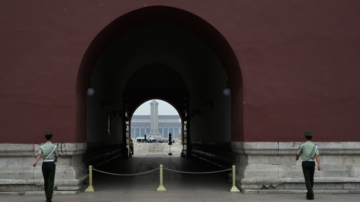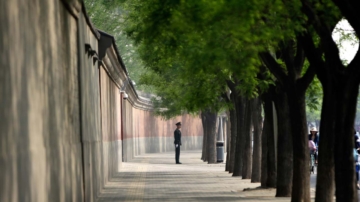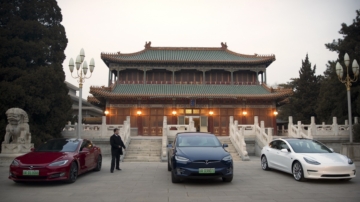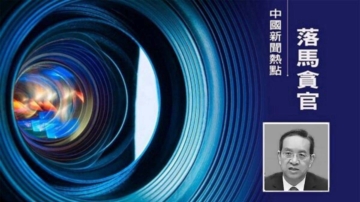【新唐人2014年05月30日讯】今年二月,中国知名博客主人张贾龙,被美国驻华大使馆选中,作为中国博主代表之一,跟当时正在访华的美国国务卿约翰•克里会晤。张贾龙在会上提出,希望美国帮助推倒中共建立的防火长城,他还批评某些美国公司参与其中助纣为虐。张贾龙日前被所在公司“腾讯”的部门领导通知解雇。27号,他接受了本台记者秦雪的采访。请看下面的报导。
2月15号,张贾龙赴“京广中心”的美国中心,跟其他三名博主王克勤、马晓霖、王冲四人参加会晤。张贾龙对克里表示,希望美国能支持渴望自由的中国人,帮助一起推倒中国的网络防火长城。他同时也谴责部分美国公司协助中国政府阻止网民登陆“推特”、“脸书”等社交媒体和封锁其他网站。
张贾龙5月27号接受《新唐人》采访时说,美国国务卿克里表示,他没有听说美国公司的那些举动,但他承诺会核查此事。
中国知名博主张贾龙:“他大概就是表示没有防火长城的话,中国的经济会更好,社会会更稳定。他觉得这个墙的存在,是负面作用大于正面作用。我提到有些美国公司在帮助中国在建墙,他说他会调查这个事情。”
2月16号,中宣部下发禁令:各网站查删“美国国务卿克里会晤4名中国网络大V谈‘互联网自由’”的相关报导。《腾讯微博》把张贾龙列为敏感词,搜索他的名字,无法显示结果。
2月17号,中共媒体《环球时报》发表社评,讽刺张贾龙《向美国务卿“要自由”,好萌的表演》。
2月18号,在外交部例行记者会上,外交部发言人华春莹说,“如果想通过这种方式使中国朝着某些人所期待的方向去转变,这未免也太过于天真了一些。”
张贾龙会见克里之后的2月17号,“腾讯”的部门领导批评了张贾龙,并且要求他写的财经评论文章,需要用其他同事的名义发表。
5月20号,张贾龙被“腾讯公司”的部门领导通知“停职”,原因就是他与美国国务卿克里会谈,发表了过激言论,和在网上公布中宣部指令。可是,要等公司“和中宣部协调”出处理意见之后,再行告知最终处理结果。
5月23号,“腾讯公司”人事部门的工作人员通知张贾龙,他因“泄露商业秘密等保密敏感信息行为”,被解除劳动合同。
张贾龙:“中国人古话讲秋后算帐嘛。当时如果解雇的话,可能他觉得不太好。毕竟别人刚走,你就马上开人不太好。第二个,可能三个月以后,影响也不像当时马上开人那么大。”
张贾龙认为,解雇他,主要是政府给“腾讯”公司施加压力所致。
张贾龙:“就是政府找他了,就是中共找他了。然后他来找我了。他都说了,你的这个处理结果,当时让我停职,他说我也不知道怎么处理你,他说还是等政府开完会,然后告诉他们怎么处理再怎么处理。这个不是腾讯能够决定的。”
在此之前,张贾龙应美国《外交政策》网站的邀请,完整的以书面文章阐述了他想对克里所说的话。他在文章里说,“1949年以来,中国统治者迫害人权,剥夺国人自由,全国民众长期处于恐惧中。中国网民至今无法自由访问完整的国际互联网。长期以来,渴望自由的中国人为争取自由流血流汗,中国人将继续努力推倒专制政府筑起的每一道墙。如果这时,美国能够帮助拆除中国臭名昭着的‘防火长城’, 将有利于中国更快的实现互联网自由”。
张贾龙同时呼吁美国对中国从事造“墙”,限制互联网自由的人员——例如“防火长城”之父方滨兴——实行外交签证制裁,拒绝为他们发放赴美签证。
张贾龙在文章里还说,希望美国政府向中国公民提供技术,允许他们撕裂防火墙并接触到世界互联网,这将让中国人更清楚的了解世界,并将鼓励他们追求自由。
张贾龙告诉《新唐人》,克里看到了这篇文章,并且还在“推特”上回覆说,他会一直倾听中国的声音。
采访编辑/秦雪 后制/周天
Zhang Jialong Demands End to "Great Fire Wall" – Seeks U.S. Help
In February this year, Zhang Jialong, was invited by the
U.S. Embassy as China's young blogger representative to meet
with U.S. Secretary of State John Kerry who was visiting China.
In the meeting, Zhang Jialong hoped the U.S. would help to
tear down China's internet censorship tool known as the Great
Fire Wall,
and condemned some American companies that assisted the
Chinese government to block social media sites in China.
Zhang Jialong was recently notified of his dismissal by Tencent.
He accepted NTD reporter Qin Xue's interview on the 27th.
The following is our report.
On February 15, along with three other bloggers Wang Keqin,
Ma Xiaolin, and Wang Chong, Zhang Jialong went to a meeting
held in the American Center of Jingguang Center.
Zhang Jialong told Kerry that he hoped the U.S. would help to
tear down China's internet censorship tool, the Great Fire Wall.
He also condemned some American companies that assisted
the Chinese government to block Twitter, Facebook and other
social media sites in China.
In the May 27 interview with NTD, Zhang Jialong said that
Kerry had not heard of these behaviors before but promised
to look into it.
Zhang Jialong: "He meant that without Great Fire Wall, China
could have had a better economy and a more stable society.
He believed the existence of the Wall has a bigger negative
impact than a positive one.
I mentioned that some American companies have assisted the
blockage, he promised to look into the matter."
On February 16, the Central Propaganda Department issued
the ban on all relevant reports on the Internet about Kerry's
meeting with the Chinese bloggers.
Tencent Weibo has listed "Zhang Jialong" as sensitive terms
for Chinese Internet search.
On Feb. 17, CCP mouthpiece Global Times editorial satirizes
Zhang Jialong's act to demand freedom from the U.S.
Secretary of State as 'lovely'.
On Feb. 18, at the Foreign Ministry's regular press meeting,
Foreign Ministry spokeswoman Hua Chunying said,
"It is a bit too naïve to think of directing China's development
according to certain people's wishes."
After meeting with Kerry, Zhang Jialong was criticized by the
Tencent supervisor on February 17 and told to publish his
financial reviews under the names of his colleagues.
On May 20, Zhang Jialong was informed of his suspension by
Tencent for his radical expressions in the meeting with the
U.S. Secretary of State John Kerry
and the propaganda directives he publicized online.
However, a final decision will be issued after Tencent
coordinated with the propaganda authorities.
On May 23, Tencent's HR department notified Zhang of the
termination of the labor contract for "leaking business secrets
and other confidential and sensitive information."
”
Zhang Jialong: "This is a retaliation against grudges.
They probably didn't think it's appropriate to dismiss me right
after he (Kerry) left.
The impact of dismissal after three months will also be lessened."
Zhang Jialong believes that Tencent's dismissal could be
a result of the pressure from the government.
Zhang Jialong: "It is from the government, the Chinese
Communist Party (CCP).
He (supervisor) came to me and said that I am put on suspension.
He mentioned that he did not know how to deal with my case,
and the decision has to wait until the government's meeting,
which Tencent can not decide."
Earlier, Zhang Jialong stated what he wished to have said to
Kerry with the invitation of the Foreign Embassy.
He wrote: "Since 1949, Chinese dictators have robbed their
people of their freedom, forcing the country's citizens to live
in fear."
"China's people are still unable to freely access the World
Wide Web."
"For many years, Chinese who aspire for freedom have spilled
their blood and sweat fighting for it.
Chinese people will continue to try to push down every wall
erected by their dictatorial government,
but if the United States could help in the effort to tear down
China's notorious Great Firewall, it would help China realize
Internet freedom sooner."
Zhang Jialong also called on U.S. authorities to deny visas to
everyone involved in building and maintaining this wall.
That includes Fang Binxing, who has designed many parts of
the Great Firewall and whom many refer to as its "father".
Zhang Jialong hoped that the U.S. government can provide
Chinese citizens with technology to allow them to scale the
Great Firewall
and access the worldwide Internet, not just the Chinese intranet.
This will allow Chinese to understand the world around them
more clearly, and it will encourage their quest for freedom.
Zhang Jialong told the NTD that Kerry has replied on Twitter
that he will continue listening to the voices of China.
Interview & Edit/Qin Xue Post-Production/Zhou Tian
2月15号,张贾龙赴“京广中心”的美国中心,跟其他三名博主王克勤、马晓霖、王冲四人参加会晤。张贾龙对克里表示,希望美国能支持渴望自由的中国人,帮助一起推倒中国的网络防火长城。他同时也谴责部分美国公司协助中国政府阻止网民登陆“推特”、“脸书”等社交媒体和封锁其他网站。
张贾龙5月27号接受《新唐人》采访时说,美国国务卿克里表示,他没有听说美国公司的那些举动,但他承诺会核查此事。
中国知名博主张贾龙:“他大概就是表示没有防火长城的话,中国的经济会更好,社会会更稳定。他觉得这个墙的存在,是负面作用大于正面作用。我提到有些美国公司在帮助中国在建墙,他说他会调查这个事情。”
2月16号,中宣部下发禁令:各网站查删“美国国务卿克里会晤4名中国网络大V谈‘互联网自由’”的相关报导。《腾讯微博》把张贾龙列为敏感词,搜索他的名字,无法显示结果。
2月17号,中共媒体《环球时报》发表社评,讽刺张贾龙《向美国务卿“要自由”,好萌的表演》。
2月18号,在外交部例行记者会上,外交部发言人华春莹说,“如果想通过这种方式使中国朝着某些人所期待的方向去转变,这未免也太过于天真了一些。”
张贾龙会见克里之后的2月17号,“腾讯”的部门领导批评了张贾龙,并且要求他写的财经评论文章,需要用其他同事的名义发表。
5月20号,张贾龙被“腾讯公司”的部门领导通知“停职”,原因就是他与美国国务卿克里会谈,发表了过激言论,和在网上公布中宣部指令。可是,要等公司“和中宣部协调”出处理意见之后,再行告知最终处理结果。
5月23号,“腾讯公司”人事部门的工作人员通知张贾龙,他因“泄露商业秘密等保密敏感信息行为”,被解除劳动合同。
张贾龙:“中国人古话讲秋后算帐嘛。当时如果解雇的话,可能他觉得不太好。毕竟别人刚走,你就马上开人不太好。第二个,可能三个月以后,影响也不像当时马上开人那么大。”
张贾龙认为,解雇他,主要是政府给“腾讯”公司施加压力所致。
张贾龙:“就是政府找他了,就是中共找他了。然后他来找我了。他都说了,你的这个处理结果,当时让我停职,他说我也不知道怎么处理你,他说还是等政府开完会,然后告诉他们怎么处理再怎么处理。这个不是腾讯能够决定的。”
在此之前,张贾龙应美国《外交政策》网站的邀请,完整的以书面文章阐述了他想对克里所说的话。他在文章里说,“1949年以来,中国统治者迫害人权,剥夺国人自由,全国民众长期处于恐惧中。中国网民至今无法自由访问完整的国际互联网。长期以来,渴望自由的中国人为争取自由流血流汗,中国人将继续努力推倒专制政府筑起的每一道墙。如果这时,美国能够帮助拆除中国臭名昭着的‘防火长城’, 将有利于中国更快的实现互联网自由”。
张贾龙同时呼吁美国对中国从事造“墙”,限制互联网自由的人员——例如“防火长城”之父方滨兴——实行外交签证制裁,拒绝为他们发放赴美签证。
张贾龙在文章里还说,希望美国政府向中国公民提供技术,允许他们撕裂防火墙并接触到世界互联网,这将让中国人更清楚的了解世界,并将鼓励他们追求自由。
张贾龙告诉《新唐人》,克里看到了这篇文章,并且还在“推特”上回覆说,他会一直倾听中国的声音。
采访编辑/秦雪 后制/周天
Zhang Jialong Demands End to "Great Fire Wall" – Seeks U.S. Help
In February this year, Zhang Jialong, was invited by the
U.S. Embassy as China's young blogger representative to meet
with U.S. Secretary of State John Kerry who was visiting China.
In the meeting, Zhang Jialong hoped the U.S. would help to
tear down China's internet censorship tool known as the Great
Fire Wall,
and condemned some American companies that assisted the
Chinese government to block social media sites in China.
Zhang Jialong was recently notified of his dismissal by Tencent.
He accepted NTD reporter Qin Xue's interview on the 27th.
The following is our report.
On February 15, along with three other bloggers Wang Keqin,
Ma Xiaolin, and Wang Chong, Zhang Jialong went to a meeting
held in the American Center of Jingguang Center.
Zhang Jialong told Kerry that he hoped the U.S. would help to
tear down China's internet censorship tool, the Great Fire Wall.
He also condemned some American companies that assisted
the Chinese government to block Twitter, Facebook and other
social media sites in China.
In the May 27 interview with NTD, Zhang Jialong said that
Kerry had not heard of these behaviors before but promised
to look into it.
Zhang Jialong: "He meant that without Great Fire Wall, China
could have had a better economy and a more stable society.
He believed the existence of the Wall has a bigger negative
impact than a positive one.
I mentioned that some American companies have assisted the
blockage, he promised to look into the matter."
On February 16, the Central Propaganda Department issued
the ban on all relevant reports on the Internet about Kerry's
meeting with the Chinese bloggers.
Tencent Weibo has listed "Zhang Jialong" as sensitive terms
for Chinese Internet search.
On Feb. 17, CCP mouthpiece Global Times editorial satirizes
Zhang Jialong's act to demand freedom from the U.S.
Secretary of State as 'lovely'.
On Feb. 18, at the Foreign Ministry's regular press meeting,
Foreign Ministry spokeswoman Hua Chunying said,
"It is a bit too naïve to think of directing China's development
according to certain people's wishes."
After meeting with Kerry, Zhang Jialong was criticized by the
Tencent supervisor on February 17 and told to publish his
financial reviews under the names of his colleagues.
On May 20, Zhang Jialong was informed of his suspension by
Tencent for his radical expressions in the meeting with the
U.S. Secretary of State John Kerry
and the propaganda directives he publicized online.
However, a final decision will be issued after Tencent
coordinated with the propaganda authorities.
On May 23, Tencent's HR department notified Zhang of the
termination of the labor contract for "leaking business secrets
and other confidential and sensitive information."
”
Zhang Jialong: "This is a retaliation against grudges.
They probably didn't think it's appropriate to dismiss me right
after he (Kerry) left.
The impact of dismissal after three months will also be lessened."
Zhang Jialong believes that Tencent's dismissal could be
a result of the pressure from the government.
Zhang Jialong: "It is from the government, the Chinese
Communist Party (CCP).
He (supervisor) came to me and said that I am put on suspension.
He mentioned that he did not know how to deal with my case,
and the decision has to wait until the government's meeting,
which Tencent can not decide."
Earlier, Zhang Jialong stated what he wished to have said to
Kerry with the invitation of the Foreign Embassy.
He wrote: "Since 1949, Chinese dictators have robbed their
people of their freedom, forcing the country's citizens to live
in fear."
"China's people are still unable to freely access the World
Wide Web."
"For many years, Chinese who aspire for freedom have spilled
their blood and sweat fighting for it.
Chinese people will continue to try to push down every wall
erected by their dictatorial government,
but if the United States could help in the effort to tear down
China's notorious Great Firewall, it would help China realize
Internet freedom sooner."
Zhang Jialong also called on U.S. authorities to deny visas to
everyone involved in building and maintaining this wall.
That includes Fang Binxing, who has designed many parts of
the Great Firewall and whom many refer to as its "father".
Zhang Jialong hoped that the U.S. government can provide
Chinese citizens with technology to allow them to scale the
Great Firewall
and access the worldwide Internet, not just the Chinese intranet.
This will allow Chinese to understand the world around them
more clearly, and it will encourage their quest for freedom.
Zhang Jialong told the NTD that Kerry has replied on Twitter
that he will continue listening to the voices of China.
Interview & Edit/Qin Xue Post-Production/Zhou Tian








